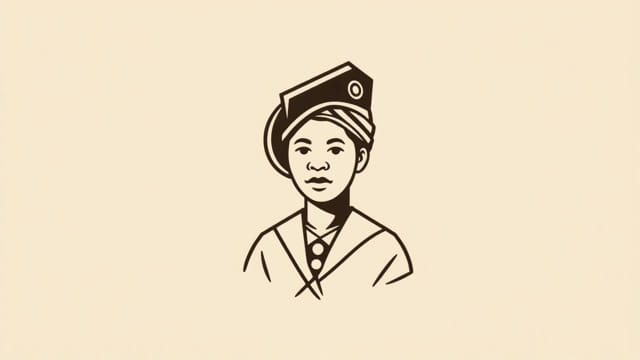Harriet Tubman is widely known as a courageous conductor of the Underground Railroad, but her contributions extend far beyond helping enslaved people escape. During the American Civil War, she played a critical role in military intelligence and direct action against the Confederacy. While she is not officially recognized as a general by military title, her leadership, bravery, and tactics during wartime earned her immense respect. Many historians and supporters refer to her as a general in an honorary sense, highlighting her exceptional command over missions that required both stealth and strategic planning.
Harriet Tubman’s Early Life and Escape from Slavery
Born into slavery around 1822 in Dorchester County, Maryland, Harriet Tubman originally named Araminta Ross endured a harsh and violent childhood. She suffered beatings, overwork, and a severe head injury that caused lifelong health issues. In 1849, Tubman escaped to freedom in Philadelphia, leaving behind her enslaved family. Her newfound liberty, however, did not diminish her connection to those still in bondage. She returned multiple times to lead others to freedom, developing skills in navigation, deception, and resistance that would later serve her well in wartime operations.
Role in the Underground Railroad
The Underground Railroad was a secret network of safe houses and abolitionists who helped enslaved individuals escape to the North. Harriet Tubman became one of its most successful and fearless conductors. Over the course of nearly a decade, she led more than a dozen missions into the South, guiding over 70 enslaved people to safety, and indirectly aiding hundreds more. Her courage and expertise in these dangerous undertakings would eventually bring her to the attention of Union military leaders during the Civil War.
Tubman’s Involvement in the Civil War
When the Civil War broke out in 1861, Harriet Tubman saw it as a chance to further her efforts against slavery. She volunteered for the Union Army, initially working as a nurse and cook for Black soldiers and newly freed enslaved people. However, her experience and resourcefulness led her to be recruited for a more critical role spying and scouting behind enemy lines.
Union Spy and Scout
Harriet Tubman became one of the first African American women to serve as a scout for the Union Army. Her knowledge of the South, its geography, and its people made her a valuable asset. She worked alongside Colonel James Montgomery, collecting intelligence and guiding Union troops through unfamiliar territory. Tubman’s efforts were especially impactful in South Carolina, where she helped identify strategic targets and recruit formerly enslaved men into Union regiments.
The Combahee River Raid
One of Tubman’s most celebrated military achievements came in June 1863 during the Combahee River Raid. This mission, led in conjunction with Colonel Montgomery, involved a surprise attack on several plantations along the river in South Carolina. Tubman helped plan the raid, navigated the swampy terrain, and gathered crucial intelligence beforehand.
The raid resulted in the destruction of Confederate supplies and the liberation of more than 700 enslaved people. It was the first military operation in U.S. history led by a woman. Tubman’s leadership, bravery, and effectiveness in this raid have led many to argue that she deserved the recognition of a general, even if not formally given the title.
Recognition and Debate Over the Title General
Despite her military contributions, Harriet Tubman never received a formal military rank or salary equivalent to that of a general or officer. She was paid poorly and inconsistently, often relying on donations and charity to support herself after the war. It wasn’t until much later in her life that the U.S. government granted her a pension for her work as a nurse, not her military leadership.
However, historians and civil rights advocates have since pushed for greater recognition of Tubman’s wartime service. Some refer to her as General Tubman in acknowledgment of her unique role, especially in the Combahee River Raid. This honorary title serves to highlight the extraordinary nature of her leadership in a time when both her race and gender excluded her from official command positions.
Legacy of Harriet Tubman’s Military Role
Whether or not she held a formal rank, Harriet Tubman’s contributions to military efforts during the Civil War were substantial. Her intelligence missions, organizational skill, and direct participation in raids significantly aided the Union cause and helped accelerate the end of slavery in the South. She not only fought for freedom but also showed the capability and strength of African American women in national defense.
Later Recognition and Honors
- In 2003, the U.S. Army Military Intelligence Corps inducted Harriet Tubman into its Hall of Fame.
- Numerous schools, parks, and buildings have been named after her in honor of her achievements.
- There are ongoing campaigns to put her image on U.S. currency and to establish more monuments in her name.
These honors, though symbolic, help correct historical oversights and celebrate the full range of Tubman’s legacy not just as a freedom fighter but as a wartime leader.
Was Harriet Tubman a General?
Technically, Harriet Tubman was not a general in the formal sense. She never held an official military rank within the Union Army. However, the term general can also symbolize leadership, vision, and strategic thinking. In that sense, Tubman’s actions during the Civil War especially her command during the Combahee River Raid earn her a rightful place among wartime leaders. Her role was unique, pioneering, and deeply impactful. Describing her as a general is not merely poetic but an acknowledgment of her irreplaceable contributions to military history and the fight for human dignity.
Today, Harriet Tubman stands as a symbol of courage, leadership, and resistance. Her legacy continues to inspire those who fight for justice and equality, and her story challenges us to recognize all who served bravely, regardless of title or status.
